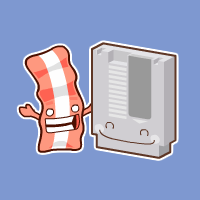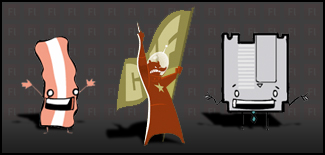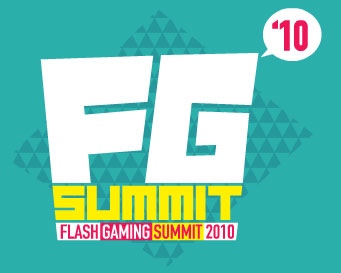Everything, By Everyone may sound like the most vaguely titled movie since Stephen King’s “IT” and perhaps it is. But it happens to be aptly named.
In 2006 Newgrounds, the web’s oldest and arguably most popular Flash portal, changed its slogan from “The Problems of the Future, Today!” to “Everything, By Everyone”. On the surface the change was an attempt to distance Newgrounds from its reputation of being a haven for negativity, teenage angst and childish toilet humor. But in reality, Newgrounds was updating its slogan to reflect what it had grown into; a collection of talented and passionate artists and programmers sharing their work with the world. Newgrounders were creating games, cartoons, music, art and a thriving community around all of it. They were, and still are, creating everything, by everyone.
 Nathan Kuruna, a filmmaker and fellow Pennsylvanian, is working on a documentary that will tell Newgrounds’ story. Besides that he’s telling a story about the evolution of online entertainment, of user generated content and how the web (and Flash) have changed the way we get, make and perceive entertainment.
Nathan Kuruna, a filmmaker and fellow Pennsylvanian, is working on a documentary that will tell Newgrounds’ story. Besides that he’s telling a story about the evolution of online entertainment, of user generated content and how the web (and Flash) have changed the way we get, make and perceive entertainment.
I had a chance to sit down with Nathan last August to talk with him about Newgrounds, Flash, and where I think they’re going. He shared with me what he’d learned in his other interviews and also what he hopes to accomplish with his film. I promise you this is a film that will not disappoint. Not only that, it will turn some heads in the process.
We’re so used to the web as it exists today that it’s hard to remember what it was like before Newgrounds, YouTube, Twitter, Facebook and blogging. In roughly a decade, the web has gone from being primarily about content consumption into a forum for self expression. User generated content has undoubtedly changed the web, but its reach extends far beyond the browser. In November of 2004, Tom Fulp and Dan Paladin leapt off the pages of Newgrounds onto the XBOX with Alien Homid, the first Flash game to cross over to a console. Edmund McMillen, another prolific Newgrounder, brought us Gish (which is now open source, by the way) and is now readying the debut of his first console game, Super Meat Boy. Meanwhile, Bo Burnham is writing a musical for Judd Apatow and Brain Waterman is making a movie with the Leslie Nielson (yes, that guy from the Naked Gun movies). User generated content has given creative minds who would have otherwise gone unnoticed a chance to compete with traditional media outlets.
 Nathan’s movie is about how this transformation came about and Newgrounds’ role in all of it. Appropriately so, he’s found his way onto Kickstarter to help get his project across the finish line. He’s shot a ton of video but he’s got hundreds of hours left to sift through, editing to do, more interviews to travel to, dvds to press, festivals to enter and lives to change. OK, that last part might have been an overstatement but we’ll never know if Nathan doesn’t get a chance to make his movie, so please consider throwing him a few bucks. He’s a hell of a nice guy and I can tell you first hand that he believes in this film and has a passion for its message. Hell, his movie may end up being proof of its own message. It’s a story worth telling and we’ll all benefit from having it told.
Nathan’s movie is about how this transformation came about and Newgrounds’ role in all of it. Appropriately so, he’s found his way onto Kickstarter to help get his project across the finish line. He’s shot a ton of video but he’s got hundreds of hours left to sift through, editing to do, more interviews to travel to, dvds to press, festivals to enter and lives to change. OK, that last part might have been an overstatement but we’ll never know if Nathan doesn’t get a chance to make his movie, so please consider throwing him a few bucks. He’s a hell of a nice guy and I can tell you first hand that he believes in this film and has a passion for its message. Hell, his movie may end up being proof of its own message. It’s a story worth telling and we’ll all benefit from having it told.
For more information, head over to the Everything, By Everyone website. If you’re already sold, click here to help him out. And if you can’t donate, that’s cool but do Nathan a favor and click one of the share buttons below or put his Kickstarter widget on your website or blog.
People are often inspired by others’ generosity, so if you find yourself reaching into your pocket to help out, leave us a comment and maybe you’ll incite a few others to follow your generous lead.


 Hop on over to Cold Hard Flash to
Hop on over to Cold Hard Flash to 


 If you didn’t have a chance to watch the live streams yesterday, all the presentations have been archived and are now available for you to watch at your leisure. Mochi posted a list
If you didn’t have a chance to watch the live streams yesterday, all the presentations have been archived and are now available for you to watch at your leisure. Mochi posted a list 